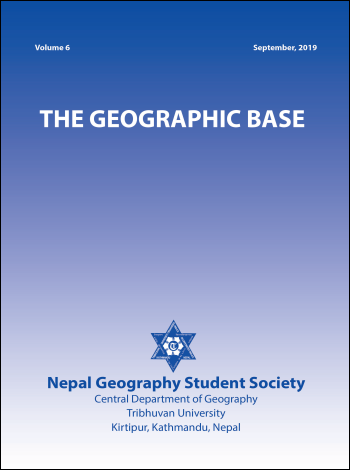Farmer’s Awareness on Pesticide Waste Management and Role of Pesticides in Water Contamination in Bahawalpur, Punjab, Pakistan
DOI:
https://doi.org/10.3126/tgb.v8i01.43472Keywords:
Sustainable pesticide usage, Managing pesticides waste, Water contamination, Pesticides pollutionAbstract
This study emphasizes the awareness and training of farmers on sustainable agricultural practices for restrictive use of pesticides to reduce water pollution caused by pesticides in rural areas. For this assessment, 150 feasible farmers were selected randomly using a convenient sampling technique. Data was collected through interviews (n=30) and questionnaires (n=120). Data was scrutinized in SPSS software. To examine freshwater contamination with pesticides, freshwater samples were collected from open water bodies (5 wells) in the area of tehsil Hasilpur (29.6902° N, 72.5796° E) and Qaimpur of Bahawalpur, Punjab, and analyzed for eight pesticides which are frequently used. ECD: Electron Capture Detector was used to detect the organochlorine pesticides, herbicides, and various halogenated hydrocarbons. NPD: Nitrogen Phosphorus Detector was used to detect nitrogen- or phosphorus[1]containing compounds. Approximately 80% of farmers revealed that they never got any training or informative 64 sessions for pest management other than using chemical pesticides. The remaining 20% were trained by some private non-toxic pesticide manufacturing firms operating in Pakistan. Although non-significant cooperation from the government bodies of the state, the correlation among respondents’ profiles and the extent of training they have received in total was positive. Results for pesticide contamination were astonishing as 6 out of 8 pesticides were detected in water samples with alarming concentrations of Carbofuran (23.1µg/l) and Monocrotophos (8.3µg/l) which can be fatal for animals and humans in prolonged usage. The use of pesticides in a preventive and sustainable way gives more protection against pests and minimizes pollution such as water pollution or air pollution, etc., caused by the chemicals (pesticides). Hence such sustainable practices must be adopted for better production and conservation of the environment.
Downloads
Downloads
Published
How to Cite
Issue
Section
License
© Nepal Geography Student Society




